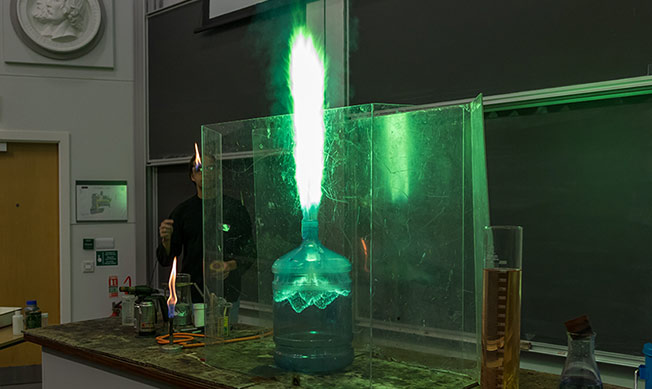Information for secondary schools
We're committed to activities that inspire young minds to get excited about chemistry, and encourage you to get your students involved.

As well as supporting the national curriculum, our events are designed to highlight the challenges of chemistry and allow students to get hands-on experience of what studying chemistry involves.
We visit schools, colleges, museums and visitor centres to give talks and demonstrations. We also arrange events that bring learners into our impressive laboratories, allowing us to set up experiments we wouldn't be able to run in other locations.
Events, demonstrations and activities
Salters' festivals
Salters' festivals are one-day events designed for school learners to visit universities and take part in fun, practical chemistry activities.
At Manchester, teams of four Year 7 or 8 students visit the University to spend the full day in the laboratory, on two experimental challenges with prizes awarded to the winning teams in each challenge.
The day is rounded off with a Flash Bang demonstration lecture.
Please see the Salters' Institute website for further information about upcoming dates and how to enter.
Flash Bang show
These live shows are ever-popular and spectacular, visually and aurally.
They are suitable for all years and the content is altered to suit, but they are particularly aimed at Year 9 students.
There is a long tradition at The University of Manchester of delivering such demonstrations, most famously the Son et Lumiere lectures of the late Dr John Salthouse. This tradition continues with several presenters, but mainly Dr Jonathan Agger and Dr Frank Mair.
Solids, liquids and gases show
This live show is a gentle demonstration for the more sensitive ears of younger audience in Years 7 and 8. It is also well-suited to senior primary pupils.
It features a series of demonstrations involving dry ice (carbon dioxide), oxygen and liquid nitrogen. As well as turning solids and liquids into gases, we also turn gases into liquids and have lots of fun with balloons, bangs and bottle-rockets.
This grabs the attention of learners to drive home issues of pressure, forces and states of matter, while also injecting plenty of excitement.
It is often delivered by trained students, closer in age group to the audience, who can also act as role models to the younger pupils.
Synthesis, spectroscopy, chromatography
This activity is directed at Year 12 students, although gifted and talented Year 11 students have also benefited in the past.
Students work in pairs to convert benzophenone into diphenylmethanol using sodium borohydride reduction. This transformation illustrates a type of reaction covered at A-level, and gives students experience of magnetically stirred reactions, four-figure balances, fumehoods and UV-visualised TLC as a method of monitoring reactions.
Each student also records their own infra-red spectra of reactant ketone and product alcohol. This shows the transformation from double-bonded C=O to single-bonded C-O in the shift to lower frequency and the growth of the new OH vibration at high frequency.
These changes underline the basis of where vibrations appear in the IR spectrum. Students then tour around NMR, X-ray diffraction and mass spectrometry facilities. They use their samples as subjects where practicable before a brief round-up talk and careers talk if desired.
Christmas lecture
Funded and organised in partnership with the local Royal Society of Chemistry, this annual lecture runs in Manchester and Bolton. The Manchester lecture is named in honour of former staff member Dr John Salthouse, who toured similar spectacular chemistry demonstration lectures around the country and even around the world.
The chosen lecturer varies from year to year, but is always entertaining and informative. Past lecturers have included Dr John Kilkoyne, 'the man in the shed' from Brainiac fame, and Dr Robyn Wheldon-Williams, world-record holder for the number of people trapped inside a bubble.
The lecture places (generally up to 30 per school) are provided free of charge. If you are not on the mailing list to which details are posted around October each year, please get in touch.
The Bolton Lectures, named in honour of Bolton school teacher Ernest Worthington, are also advertised via the same mechanism. Together they help to enthuse around 1,000 children per annum with the joys of chemistry.
Spectroscopy in a Suitcase
The Royal Society of Chemistry’s (RSC) Spectroscopy in a Suitcase scheme gives students the chance to learn about spectroscopy through hands-on experience.
At Manchester we host a Bruker Alpha FT-IR spectrometer with which University students deliver workshops in schools. As well as learning about spectroscopy, students can also learn about life at university, studying chemistry and chemistry career opportunities. Spectroscopy in a Suitcase (SIAS) is fully funded by RSC.
For full details of the workshops and to book a place for your school, please visit the RSC website.
Nuffield summer research placements
The Department of Chemistry and the Nuffield Foundation gives students the chance to find out more about a career in science.
Whether they are committed to becoming a research scientist, or would simply like to find out more about what these diverse subjects can offer, a Nuffield Research Placement is designed to give young students a worthwhile summer experience and the opportunity to be among the next generation of science professionals.
The Department welcomes applications from up to ten students per year in Year 12 to the scheme. Find out more on the Nuffield Foundation website.

